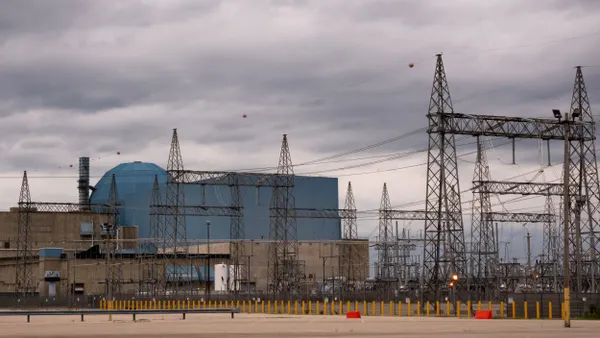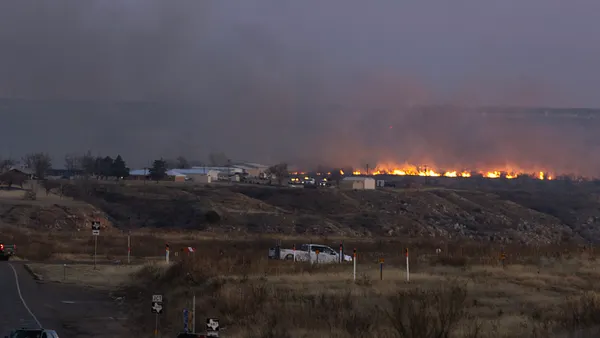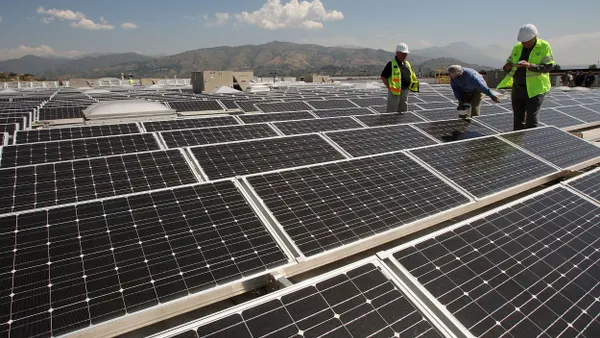Dive Brief:
- CEOs of public power companies said they are exploring more teleworking options for their employees after discovering benefits during the response to COVID-19, during a June 8 webinar hosted by the American Public Power Association.
-
The CEOs said the unintentional experiment changed their perceptions of remote work, which they say has boosted efficiency and bridged generational divides.
- New York Power Authority (NYPA) and other public utilities have already begun ordering new equipment to support remote teams. One-third of NYPA employees may transition to predominantly remote jobs.
Dive Insight:
Hundreds of public utility employees may not return to on-site work before the end of this year — and may continue teleworking perpetually thanks to a "new normal" established by COVID-19.
NYPA CEO Gil Quiniones said the company will likely divide employees into one of three groups going forward. The first group, he said, will return to full-time work onsite or in the field. The second group will work part-time in the field, and part-time from home. And the third group, he said, "will only come to the office or worksite from time to time."
Quiniones said NYPA has already begun purchasing equipment to make the transition possible, and that the utility's 2,000 employees are "already on our way to the reality of that new normal."
Rob McGarrah, general manager of electric and gas utilities for the City of Tallahassee, said watching his team work from home has changed his perspective on remote work.
"We've opened folks' eyes to doing business a different way across the utility and across the city," he said. "We had to figure out how to change from a bureaucratic, paperwork society, to a nimble electronic society, and telework is just one of those pieces."
Beginning in mid-March, McGarrah said, Tallahassee split its field crews in half and assigned them two weeks on, two weeks off schedules to reduce the number of workers concentrated at a single site. Shift workers sequestered at work during their weeks on assignment, and sheltered in place at home when off work. Office workers who could do so were instructed to work from home.
Since May, Tallahassee has discontinued the sequestration schedule and returned nearly all field crews to their normal work schedules. But the teleworkers, he said, "are still teleworking, and I don't expect that to change until later in the summer at the earliest. That seems to be working well for us."
At Seattle City Light, General Manager and CEO Debra Smith said implementing teleworking will help the city utility bridge a generational gap.
"We have struggled for a long time to embrace teleworking, which is something our young employees want," Smith said. "Now we know it can work."
Smith said she herself "doubts very much that I will ever work five days a week in the office again." She said she will spend more time in the field and be more available to employees.
Work schedules were far from the only thing changed by COVID-19. According to Quiniones, NYPA issued $1.2 billion in bonds this past March to increase liquidity, in addition to sequestering 85% of their employees.
McGarrah said Tallahassee took steps to provide financial relief to customers. In addition to suspending disconnections for nonpayment, the city modified and expanded a relief program that allows customers to stretch their winter utility bills over multiple months.
Customers who demonstrate financial need may now defer their March-May utility bills until September, after which they will pay the balance over six interest-free payments. About 1,200 residents and 200 businesses have enrolled in the program, he said.
Tallahassee also passed $6.3 million in unspent fuel savings to customers by applying the savings to a single monthly bill, which cut the typical residential bill by 27% at the height of the pandemic.
The CEOs agreed that the most challenging aspect of the pandemic response was learning to communicate effectively with their newly remote teams.
"Communication was really hard at first," said Troy Adams, general manager at Manitowoc Public Utilities in Wisconsin. "If I had to do it all over again, I would have done more video, because I ... heard from employees that it's a better way to engage them. It's way outside my comfort zone, but I'm getting better."













